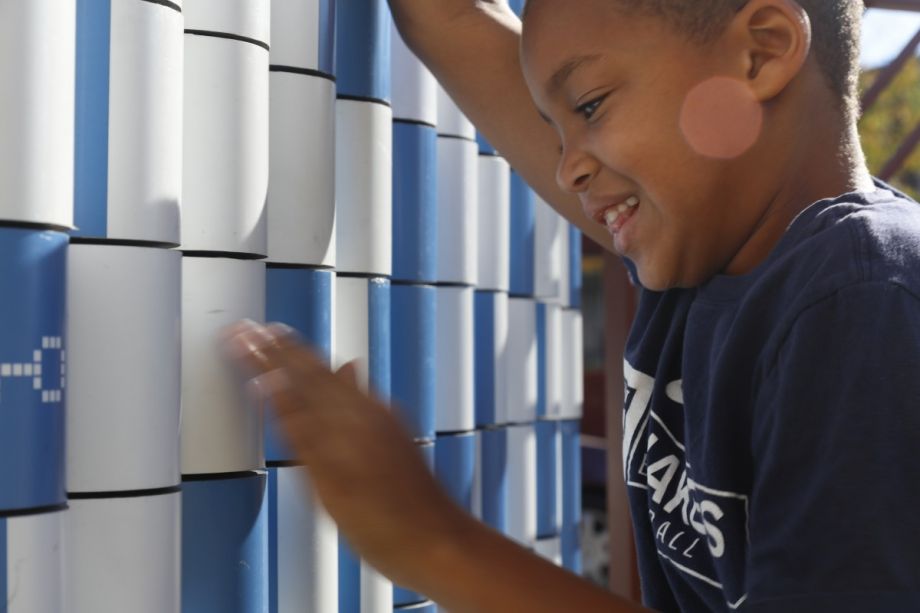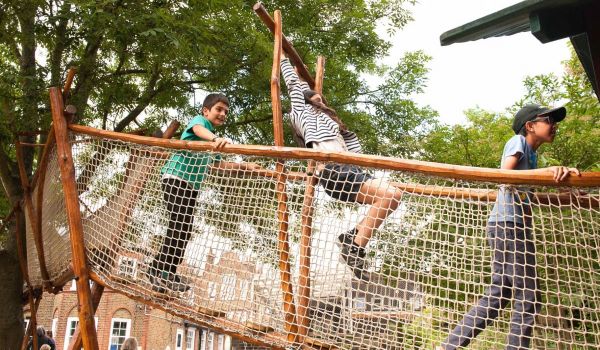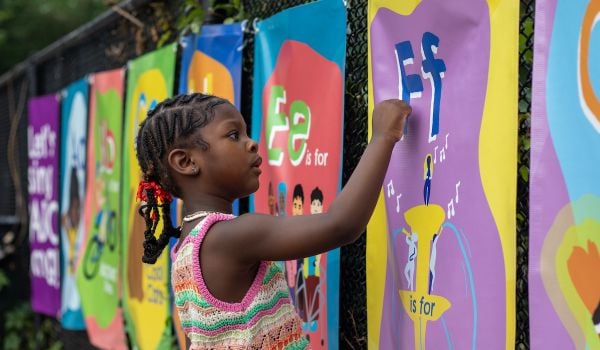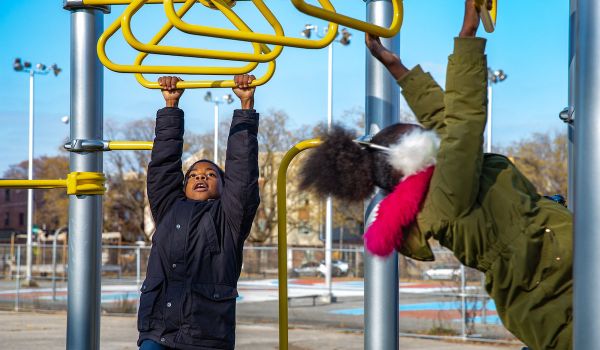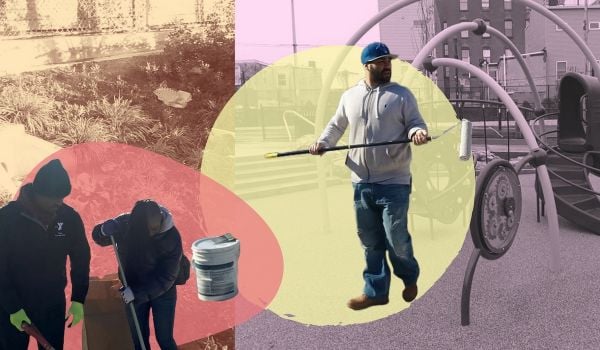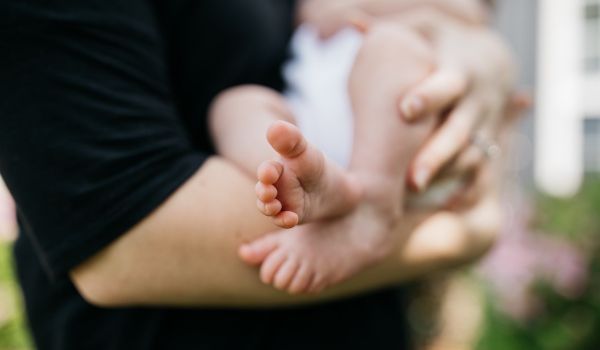Philadelphia resident and Temple University professor Kathy Hirsh-Pasek was walking through the streets of her hometown and asked herself: Why does a sidewalk have to be a sidewalk? And a bench, a bench? In short, she thought: “What if we could create whole communities that looked really inviting for families and helped children get learning opportunities outside the school walls by reimagining public spaces as the new public squares?”
In 2015, she and a student of hers wrote a one-paragraph proposal about reinventing public spaces with learning opportunities for a city competition and to their surprise, were the only non-architects named finalists.
Since then, Hirsh-Pasek, a professor of psychology, co-founded Playful Learning Landscapes with University of Delaware professor, Roberta Golinkoff, to re-envision Philadelphia for its youngest city-dwellers. The team has successfully converted ordinary sites into playful learning spaces for communities across the city that are rooted in early childhood education research and community engagement. Everyday public spaces have transformed into miniature public squares, human-sized board games have taken over sidewalks, and bus stops have metamorphosed into moveable puzzles meshed with community history.
Children spend 80 percent of their waking hours outside the classroom. And with remote learning, particularly for minority kids, that number is creeping towards 100. During the pandemic, the team promoted ways to incorporate playful learning into pandemic routines through its “Play in the Pandemic” initiative. But even before Covid-19, the Playful Learning Landscapes team created fun spaces in Philly for children—and adults, to develop skills in math, science, language, and reading, with the philosophy that learning shouldn’t only happen in the classroom.
The team went into Philadelphia neighborhoods and asked communities what they wanted to see in their public spaces. One of the team’s early initiatives, Urban Thinkscape, added activities to a public bus stop to promote spatial skills and community history in Philadelphia’s Belmont community. “A lot of times, people sit at the bus stop with their children and the children are wrecking their nerves waiting for the bus,” says Bettye Ferguson, a community member and president of the Belmont Alliance Civic Association. “And we felt like, oh wow, [Urban Thinkscape] is an opportunity to engage adults along with children during a pass time.”
When the team first acquired the land for Urban Thinkscape, it was by a grassy lot—and not a particularly large one at that. But members of the local Belmont neighborhood chose the plot because in 1965, Martin Luther King Jr. gave a historic speech on the land during his “Freedom Now” tour. The activities at the bus stop by the plot memorialize and celebrate this history while simultaneously providing fun and educational learning activities. The puzzle wall at the stop depicts Martin Luther King Jr. on one side and on the other, a well-known pastor in the Belmont district. In the “Hidden Figures” installation, children can search in metalwork for images of objects like food and animals to build curiosity and spatial skills. And the “Jumping Feet” game addresses impulse control. “Not only did the children play at [the bus stop], but the adults did as well,” Ferguson says.
For the Belmont district, the bus stop has been more than just a playful activity, but a community one. The community contributes to every stage of the development process, from brainstorming to helping build the installations. “At every single phase of this initiative, we take super seriously that neighborhoods don’t belong to people who impose things, they belong to the people who live there,” Hirsh-Pasek says. “[These playful learning landscapes] are an opportunity to create culturally relevant places for neighborhoods, and places that could build more equity and use neighborhoods and cultures as funnels of knowledge to make public spaces more inviting,” she adds.
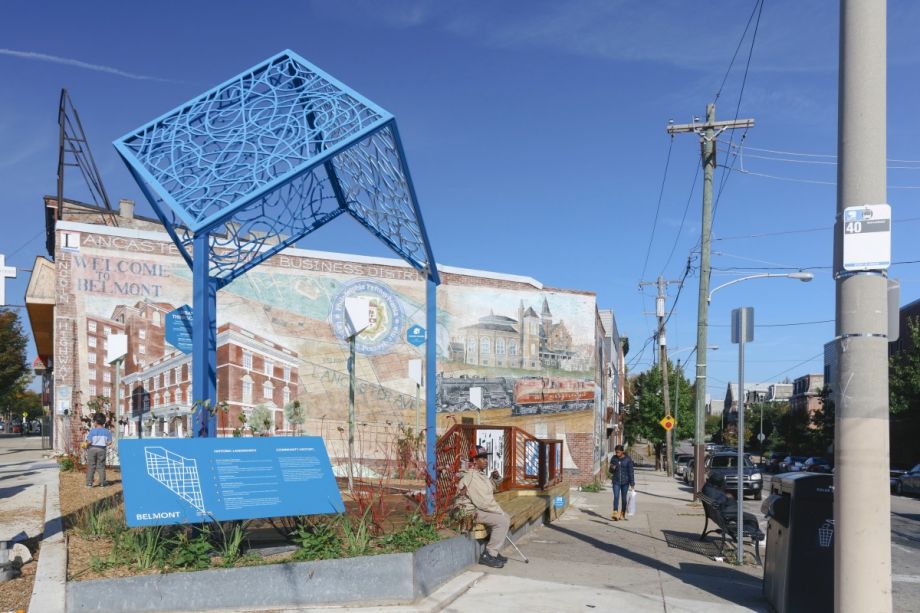
(Photo by Sahar Coston-Hardy, courtesy Playful Learning Landscapes)
The installation has been well received by the community. “In the Belmont district, we do not have outdoor social space. We do not have an indoor social space. There is no community center or playground adequate enough to house all the new people settling in this district,” Ferguson says. “[Urban Thinkscape] is totally geared towards early childhood education and skill-building. And now we are going to move [the installation] to where it will have more interaction with the children.” The new location will be a few blocks away and across the street from the Belmont Charter School.
The team has since expanded to other cities, including Santa Ana, CA. Here, researchers redesigned a basketball court at a local school with STEM education to improve counting by fractions and decimals. The three-point arc was converted into a one-point arc. Smaller arcs drawn closer to the net are each part of a point. The left side of the court has decimals and the right side fractions. Kids can count on a number line to keep track of their score.
The basketball court, along with other outdoor activities, has been particularly crucial in the past year, Andres Bustamante of Playful Learning Landscapes says. “During the pandemic, there has been a great need by schools to spend more time outside, and to have less crowded spaces and more kids outside the classroom.”
These playful learning landscapes are more than just a fun concept. The team’s playful interventions have increased communication among parents and children in low-income families, improved STEM literacy, decreased mobile device usage, and fostered interactions between children and caregivers. Playful Learning Landscapes have been adopted across the United States in cities like Chicago and Boston.
Philly may be a trendsetter in the U.S. But across the globe communities are reimagining their cities as tyke-friendly metropolises.
By 2030, children are projected to make up the majority of the world’s urban population. And by 2050, it’s estimated that almost 70 percent of the world’s children will be living in urban areas. The planning consulting firm Arup released a report in 2017, arguing that “the benefits of a child-friendly city go beyond children to add value to all citizen’s lives,” and that a “child-friendly approach will allow us to tackle issues in a more holistic and integrated manner.” The initial goal for Playful Learning Landscapes was to create learning opportunities for children within the city, but it has boiled down to asking community members: “What do you want to see for your neighborhood?
“Everything about [Playful Learning Landscapes] is about starting with what the neighbors want with what we can make possible for them,” Hirsh-Pasek says. For the team, designing for children means creating inclusive places that welcome cultural differences and community input. It means designing for populations who have historically been ignored in the urban planning process.
Ultimately, what communities want are safe spaces. And they want places for kids to play and learn and for the community to feel heard and respected, Hirsh-Pasek says. “They want something beautiful that will make people come into the neighborhood, not flee it.”
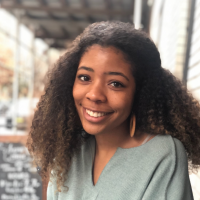
Mia Jackson is a master's student at the Bartlett School of Architecture, University College London. Her writing about cities, health and innovation has appeared in Newsweek, The Daily Beast, The Virginian-Pilot and elsewhere.

